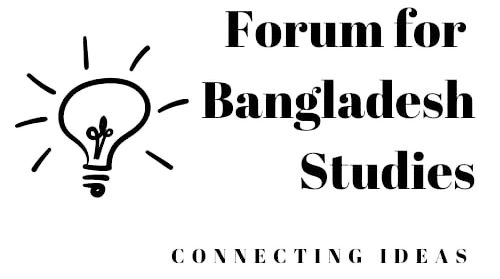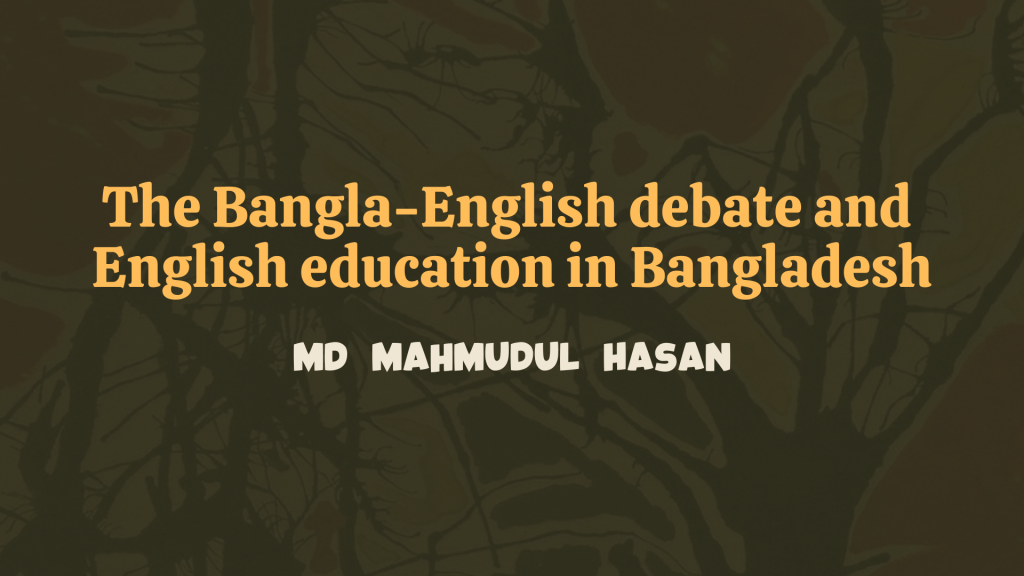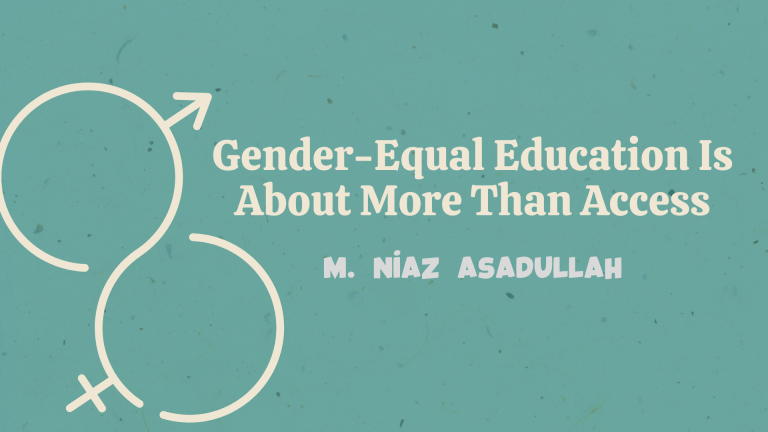IT MAY sound like a joke, but it is true that many of the educated gentry in Bangladesh who argue for the widespread use of Bangla send their children to English medium schools. Or, at the very least, they spend a considerable amount of money on making their wards competent in English. A near-frantic sense of urgency to teach the language to children as quickly as possible is present among most Bangladeshi parents. As a result, English education has become a huge industry in the country.
I have seen the desperation of parents seeking ways for their young children to learn English from a very early age. They make a conscious effort to teach their children English words even before they learn how to speak. Because of pronunciation deficiency and limited repertoire of vocabulary at their disposal, in a way the very idea of teaching English words to their children in a non-native environment can be rather confusing, leading to negative outcomes. All these result in linguistic miscegenation and, in cases, linguistic aberration and nightmare.
In Britain, I once met a Bangladeshi family who were there for academic reasons. On the very first day when I met them, one member of the family told me that they didn’t like mixing with people from Bangladesh. I was surprised that they could make such a statement, knowing that I was a Bangladeshi who helped them settle in the city where we were living. I wore an air of politeness and hid my shock by putting a smile on my face.
The same attitude spills over into the approach of many Bangladeshis to the Bangla language. Many people seek to distance themselves and their children from it in order to gain respectability and prestige. Decades ago, I attended a talk in Dhaka. One of the speakers was a Bangladeshi who had gone to the west for higher education and then settled there. At the outset of his speech, he told the audience that his Bangla was not very good and apologised in advance that he might code-switch to English as his presentation would progress.
As I had anticipated, he spoke wonderful Bangla all through his speech. I knew very well that he had spent the formative period of his life in Bangladesh and that it was impossible that his stay in an English-speaking country for a few years would make him forget his mother tongue. I was proved right.
The relation between Bangla and the nouveau riche who seek to distance themselves from the language can be compared to the one between a loving mother and her wicked children. The ingenuous children get to know some other motherly figures who look ostentatious and compare them to their mother who is rustic but gracious. The children are drawn to those flamboyant mother figures without any guarantee that they will receive comparable affection from them. Similarly, our mother tongue, Bangla, loves us unconditionally, despite the misrelation that some of us maintain with her.
I know some people who are very articulate in Bangla. But when they speak English, the sound often jars on ears. It is not because they have an accent or because they don’t use Received Pronunciation. It is the lack of uniformity and consistency that frustrates their linguistic performance in (spoken) English. If we could become a bilingual and diglossic speech community and establish a distinct and nativised variety of English, we could feel proud of it. However, unfortunately, that has not developed yet.
The long and short of the matter is that, despite our seasonal and hyperbolic linguistic sentimentality, our true attitude to Bangla is tainted by paradox and insincerity.
As regards our collective frenzy to learn English and teach it to others, I have a pertinent question to ask: What is the level of English proficiency of most educated people in Bangladesh?
The answer that I have is unflattering. Let me discuss a related issue before illustrating it.
Years ago, I read a document that said that in Japan 2 per cent of the population knew English and met 100 per cent of their language need in terms of representing their country to the outside world. The current statistics of the Japanese who know English may have gone up somewhat. However, the fact remains that English education is much more widespread in Bangladesh than in Japan.
As English is taught right from the first day children enter school in Bangladesh, all educated Bangladeshis know (a smidgen of) English. But do we have that critical minority of 2 per cent in the population who can articulate our identity and values and tell the world who we are and what we stand for?
One way to find the answer to this question is to compare the linguistic quality of English materials published from Bangladesh and those from Japan. Or, we may wish to compare the English language proficiency of diplomats of the two countries to ascertain the level of their English language ability. The findings of such research may not make us happy.
Most Bangladeshi government departments in Bangladesh and diplomatic missions abroad have their bilingual websites (in Bangla and English). All such departments and missions are manned and led by people who have learnt English since the beginning of their formal schooling. Researchers may wish to assess the linguistic quality of these websites. I can say with some certainty that the quality of English of these online domains can be downright depressing.
Bangladesh has tens of thousands of educators who teach English at various levels. They are the key players in the industry of English education. The level of their English proficiency has a direct bearing on that of their students. Members of the public may know about their English language ability if they publish books or essays in English.
However, the Internet had created a global virtual realm and gathered us in one place: the social media platform. Many such teachers are keyboard warriors and cyber troopers; they are active on social media where they post messages and statuses in English. It will be interesting to look at the quality of English of the messages and statuses they share on social media. Again, I can anticipate that the findings may point to mediocrity beyond repair.
Through anecdotal and reflective observations, in this essay I have sought to argue that, despite our deep interest — verging on hysteria — in English education, we have not been able to produce a critical minority who can represent our country and its people on the world stage with confident professionalism. The English proficiency of most educated people of Bangladesh is average or below average — inadequate to articulate our emotions, ideas and understanding of the world. All these demand a serious rethinking and reworking of English education policies in the country.
While we should remain grounded in and true to Bangla, we need English to communicate and negotiate with those who are not conversant with our mother tongue. Do we have enough people to do that? Are we happy with the vast majority of educated people knowing ‘some English’ or do we perhaps need merely 2 per cent who are competent and confident in English to represent our nation?
I believe the bilingual debate and such questions of ‘acquiring proficiency’ in English are important for many countries where it is taught as a second or foreign language.



